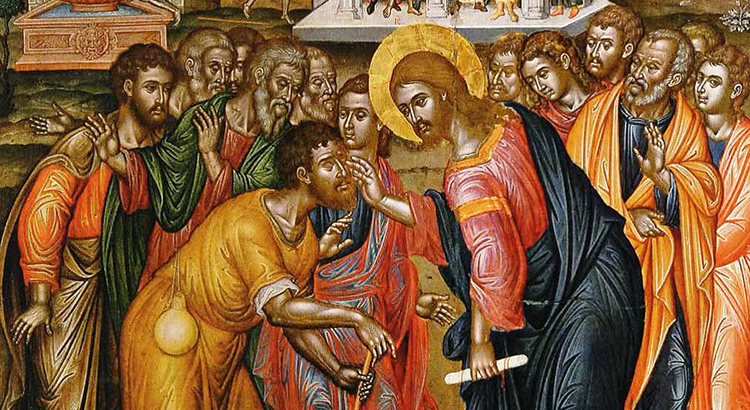Prayer for the sick
The prayer for the sick is held in the Basilica of Santa Maria in Trastevere.
Reading of the Word of God
Alleluia, alleluia, alleluia
This is the Gospel of the poor,
liberation for the imprisoned,
sight for the blind,
freedom for the oppressed.
Alleluia, alleluia, alleluia
Numbers 11,4-15
The rabble who had joined the people were feeling the pangs of hunger, and the Israelites began to weep again. 'Who will give us meat to eat?' they said. 'Think of the fish we used to eat free in Egypt, the cucumbers, melons, leeks, onions and garlic! But now we are withering away; there is nothing wherever we look except this manna!' The manna was like coriander seed and had the appearance of bdellium. The people went round gathering it, and ground it in a mill or crushed it with a pestle; it was then cooked in a pot and made into pancakes. It tasted like cake made with oil. When the dew fell on the camp at night-time, the manna fell with it. Moses heard the people weeping, each family at the door of its tent. Yahweh's anger was greatly aroused; Moses too found it disgraceful, and he said to Yahweh: 'Why do you treat your servant so badly? In what respect have I failed to win your favour, for you to lay the burden of all these people on me? Was it I who conceived all these people, was I their father, for you to say to me, "Carry them in your arms, like a foster-father carrying an unweaned child, to the country which I swore to give their fathers"? Where am I to find meat to give all these people, pestering me with their tears and saying, "Give us meat to eat"? I cannot carry all these people on my own; the weight is too much for me. If this is how you mean to treat me, please kill me outright! If only I could win your favour and be spared the sight of my misery!'
Alleluia, alleluia, alleluia
The Son of Man came to serve,
whoever wants to be great
should become servant of all.
Alleluia, alleluia, alleluia
This Bible passage opens with the complaint of the people of Israel who do not have sufficient food as they had it in Egypt, in slavery. Rather, during those terrible years they had a great variety of food that the text lists: "We remember the fish we used to eat in Egypt for nothing, the cucumbers, the melons, the leeks, the onions, and the garlic" (v. 5). Now they have only manna. But the daily manna should have urged the people to have full trust in God who provided them with what they needed day in and day out. Also, Jesus said: "Therefore do not worry, saying, "What will we eat?" or "What will we drink?" or "What will we wear?" For it is the Gentiles who strive for all these things; and indeed, your heavenly Father knows that you need all these things" (Mt 6:31-32). The Israelites refuse to be satisfied of the gifts that God gave them and therefore complained. Evil always generates in us the belief we do not have enough, and therefore we are abandoned, without seeing the many signs of God's mercy and presence. So, we are taken by "greed," the temptation to possess, consume, measure, to have today, to seize the reward. The past becomes nostalgia of what was left behind, forgetting that we were actually slaves, and that the food we ate was full of bitterness. And when we look back, we no longer recognize the gifts we have received. Moses listens to the complaint of his people and makes it his own. He feels all his inadequacy and submits it to God: "I am not able to carry all this people alone, for they are too heavy for me." Often the disciples of the Lord feel the tiredness of their journey, and they demand security and a full life. But God is not offended; he listens to everything and leaves no request unheard.
